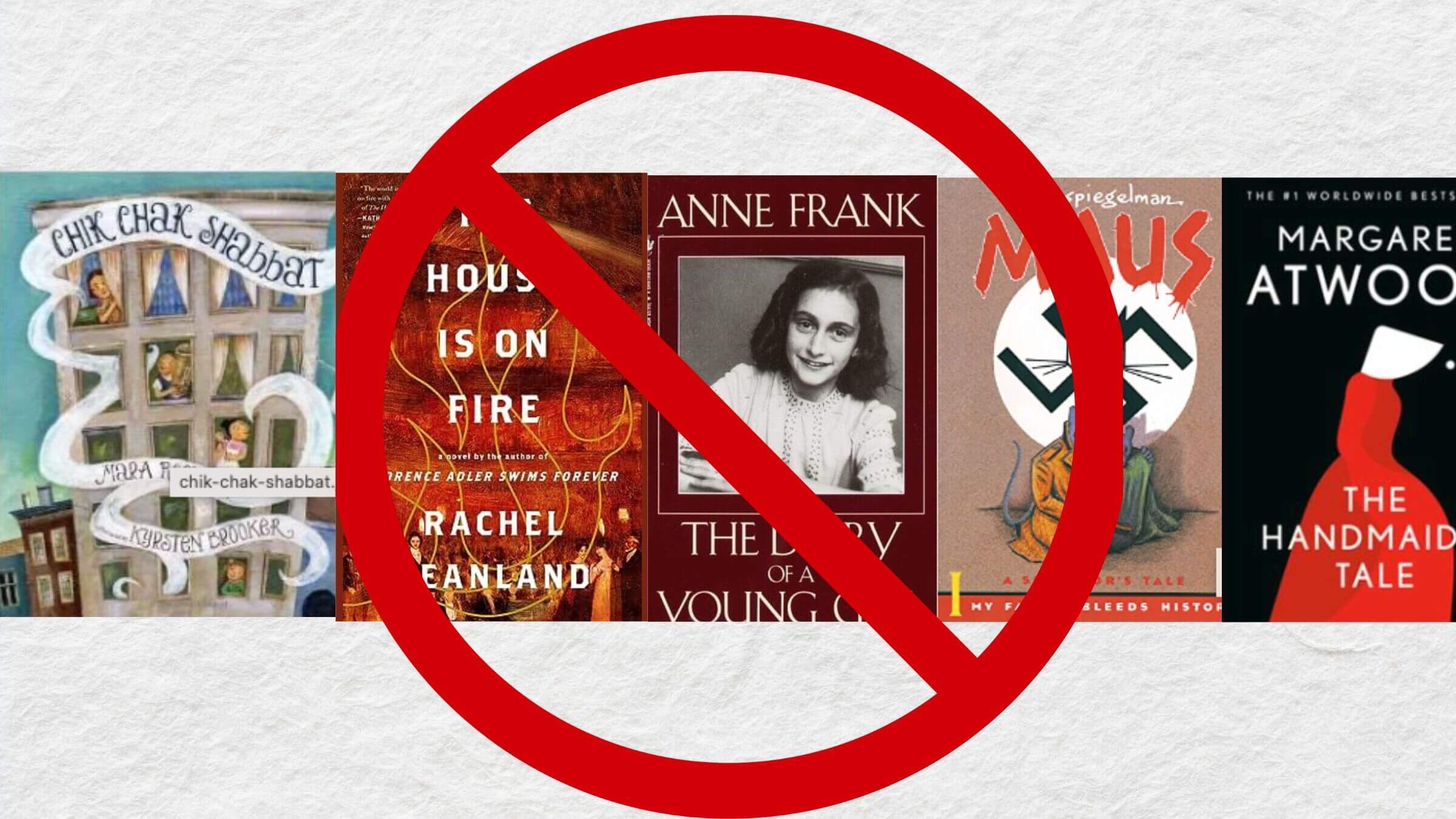A canceled JCC book talk shows Jews are entering a dangerous era of self-censorship
The Jewish author was told by the Mandel JCC in Florida that the political climate was ‘complicated’

As state laws limiting freedom of expression proliferate across the country, a culture of self-censorship takes hold. Graphic by Nora Berman
Last month, a Florida JCC canceled a book talk by author Rachel Beanland because her novel The House is On Fire, is set amid slavery and deals with themes of racial justice.
After Beanland posted a copy of the emails disinviting her from the venue, the Mandel JCC in Boynton Beach and Palm Beach Gardens reversed course, firing the employee they said was responsible for the decision, and issuing an apology and a renewed invitation for Beanland. She declined.
Given the profound challenges to free speech in schools, libraries and universities across the country, it would be easy to dismiss the brouhaha at a local JCC as a minor skirmish in a larger fight.
But this incident is a glaring example of one of the most insidious aspects of recent legislation aimed at barring certain ideas and discussions from public venues: the ways in which institutions and individuals across society are being pressed into service as censors, feeling forced to work the will of heavy-handed government bodies bent on suppressing speech and ideas.
As part of his ongoing efforts to enforce his own particular ideology in schools and other public institutions across Florida, Gov. Ron DeSantis last year signed the “Stop WOKE Act,” legislation that prohibits teachers in public schools from instruction that could make someone feel guilt or psychological distress on account of their race or sex.
That law, which conflates any discussion of racism with racism itself, has already had profound impacts — as dramatically illustrated by photos of classroom library shelves stripped bare by teachers, who feared legal liability if a forbidden concept slipped into a book about Rosa Parks, Ruby Bridges or Anne Frank. Other laws sweeping Florida and states nationwide have amplified this chilling effect, providing members of the public with new tools to challenge curricula and intimidate educators into self-censoring books and classroom materials.
The ahistorical climate that the law creates affects not just teachers, librarians and school administrators, who are put in the position of having to remove books, pare back curriculums and shush classroom discussions for fear of legal reprisal. This environment also impacts the Mandel JCC, even though the law, as written, has no direct bearing on what books can be discussed in a gathering hosted by an independent community group on private property.
It’s not hard to see how the broader censorious atmosphere influenced the JCC’s decision to disinvite Beanland. “This is Florida,” an official from the JCC wrote to Beanland as the center backed away from her book. “Our politics around the Black community, the history of the Civil War, and education in general are complicated.”
Our conversation about laws that undermine free expression like the Stop WOKE Act often focuses on how the law is enforced — how violations are tracked, and what punishments may ensue. But as the Mandel JCC email makes clear, fear, ambiguity and simple misunderstandings can create a landscape in which the suppression of ideas becomes not the exception but the rule.
Teachers who are worried a certain lesson might threaten their teaching licenses now decide to swap a less interesting text into their curriculum just to be safe. Librarians selecting which books to purchase err on the side of caution. And JCCs wishing to stay out of the “complicated” politics of slavery and the Civil War opt to cancel a program rather than figure out what risks they may incur by hosting it.
The only thing unusual about Beanland’s case is that the JCC made the decision to invite her and then reversed themselves. Most of the time, undoubtedly, the choice to avoid a controversial book is made from the get-go, invisibly. People who feel intimidated naturally gravitate away from that which they fear could come back to bite them. There are countless Rachel Beanlands, whose books are silently erased from curriculums, libraries and independent communal spaces like the Mandel JCC. It is perhaps too soon to tell the effect this loss will have on our children, but we are already seeing its cultural impact.
That surreptitious chilling effect — which is difficult to spot and almost impossible to measure — is deeply disturbing for everyone who cares about the free exchange of ideas. And it should be doubly worrisome for the Jewish community. Attacks on free speech are not limited to issues of race and sexuality.
In Florida’s Duval County Public School District, Chik Chack Shabbat, a picture book about a little girl rallying her community to help a neighbor too sick to make cholent, was banned pending further review. More chillingly, a high school in Indian River County removed a graphic novel based on Anne Frank’s diary, while Maus, Art Spiegelman’s Pulitzer Prize-winning graphic novel of his parents’ experience in the Holocaust, is now banned in school districts in Florida, Texas, Missouri and Tennessee.
We know about those cases. What we don’t know is how many copies of Maus were discretely removed from library and classroom shelves to avoid that “complicated” politics of antisemitism.
In Boynton Beach and Palm Beach Gardens, the leaders of the JCC may have learned their lesson, and fans have rallied to Rachel Beanland’s defense. Perhaps next time those who feel compelled to do the work of the censors will instead stand up and resist.
To contact the author, email [email protected].














